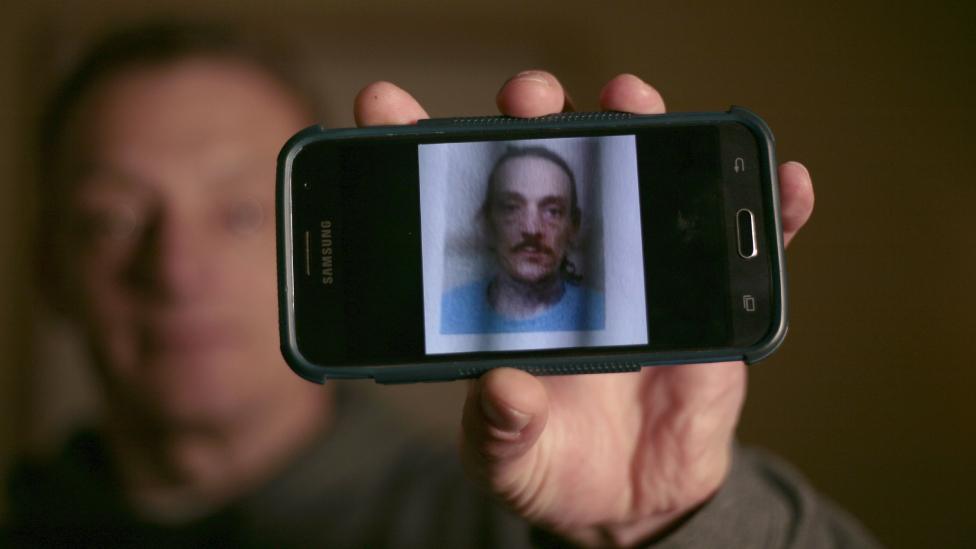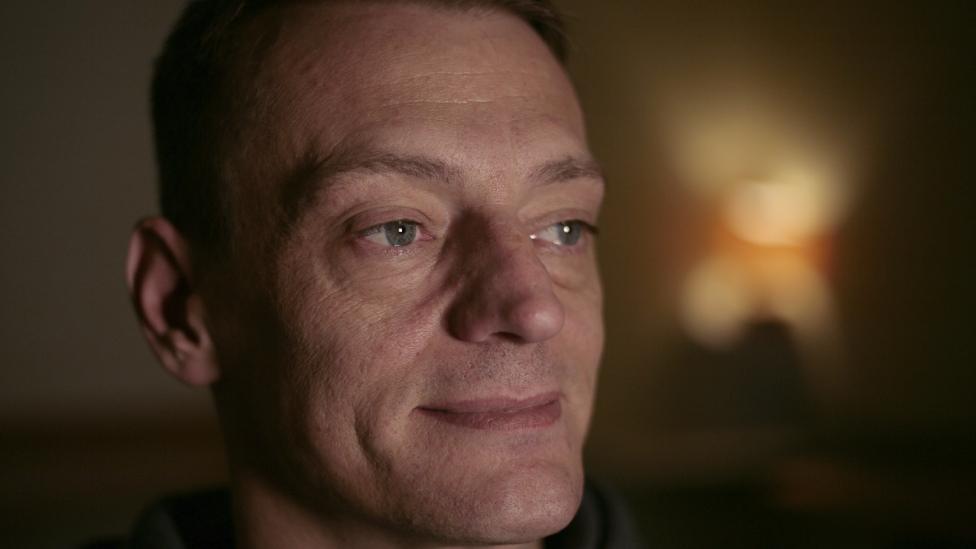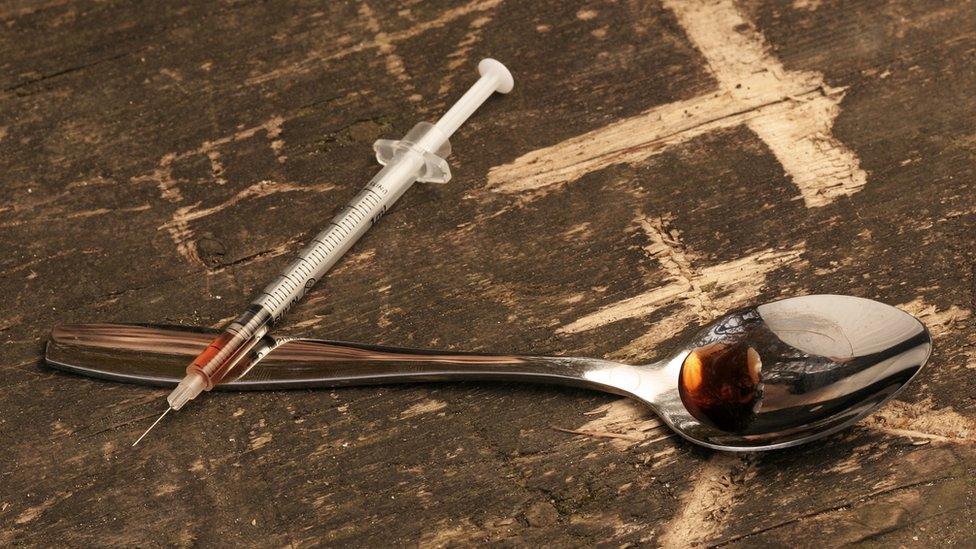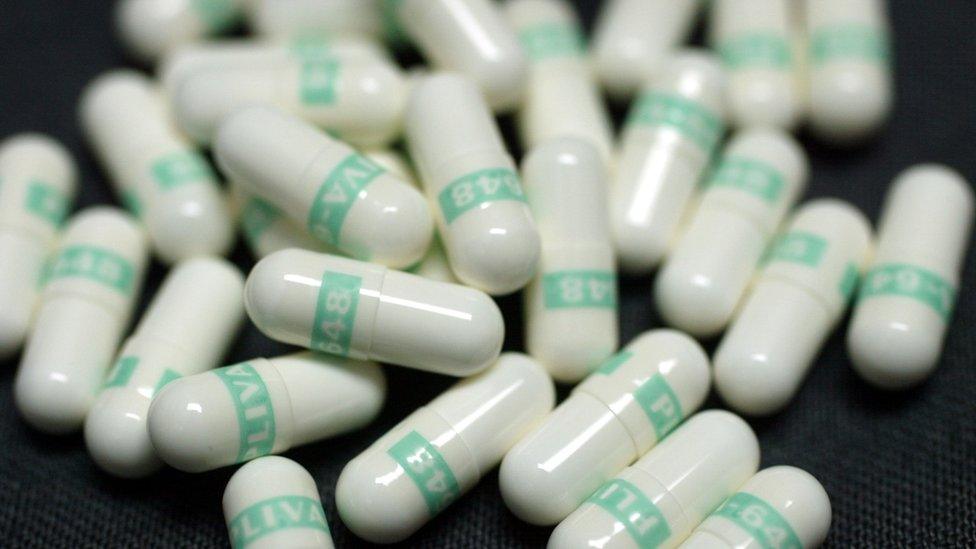Addiction: Heroin users 'need quicker prescriptions access'
- Published
Tony Davies was addicted to heroin on and off for 19 years
Recovering heroin users need quicker access to prescription drugs to stop self-medication, researchers have said.
Researchers spoke to 60 users across Wales sourcing their own medication, including heroin substitutes, with many saying they were hard to get from their GP.
Drug-misuse deaths in Wales hit a record high in 2018.
The Welsh Government said there had been "sustained improvements in waiting times" with aims for more improvement.
The team from the University of South Wales (USW) spoke to people who had previously and were currently using heroin, including some in prison, asking them how and why they self-medicated prescription-only drugs.
Prof Katy Holloway, who led the study, said it suggested access to heroin substitutes, such as methadone and buprenorphine, should be made "quicker and easier" to avoid self-medication with its increased risks of overdose.
"There are waiting lists and we think it should be improved, so that no-one has to wait," she said.
"They present for treatment, they've got the courage to attend, let's get them into treatment as quickly as possible."
Drug-related deaths reached a record high in England and Wales in 2018, according to the official figures, with 208 drug-misuse deaths in Wales in that time.
The latest available, external figures for Wales show that 91% of people seeking help for substance misuse are put on some form of treatment within 20 working days of being referred.
However, it can take weeks or months for a patient to be put on heroin substitute drugs.

'You want help there and then'

Tony Davies said he was unrecognisable, even to his own family, when he arrived in prison in the grip of heroin addiction in 2016
Tony Davies, 42, a father-of-two from Newport, was addicted to heroin on and off for 19 years.
He said when he tried to get clean there was sometimes a lag between him seeing a GP and being put on heroin replacement treatment.
"When you're motivated to give up a drug, not just heroin, you want help there and then," Mr Davies said.
"For me, it was the waiting to go into treatment that always made me go, 'right, OK then, if I can't get in that quick, I'll buy it myself'.
"So I'd buy methadone on the street, or Valium. I'd run out, or I couldn't get it, so I'd go straight back to the heroin."
Mr Davies said he understood people would have little sympathy, but claimed detox was "a horrible thing to go through".
Once he got a prescription, Mr Davies said he would turn to the streets or trick doctors if he needed more to get through withdrawal.

Tony Davies says he had to "keep going forward" after kicking his addiction to heroin and other substances in prison
"I've lied to loads of doctors over the years," he said.
"I've told them I've lost my prescription, I've had my prescription stolen. There's loads of excuses. They do cotton on eventually.
"I've even changed the number on prescriptions in the past so I'm getting double the tablets. You'll try anything."
Mr Davies said he and other users he knew would also struggle to get medicines for other problems while they were in recovery.
"You'd go in for your mental health, and if you suffered from both they'd normally say 'well, it's the substances. Give the substances up, your mental health will improve'.
"But it's not the way - a lot of people have mental health problems before the substances.
"And that's where the self-medicating comes in."
Mr Davies finally managed to kick the habit after he was jailed for an attempted robbery in 2016 - a "two-second" lapse in judgement he deeply regrets.
He now works at the substance misuse and mental health peer mentoring service Cyfle Cymru, and he said he is focused on "going forward".


The USW Substance Use Research Group, which helps advise the Welsh Government on policy, confirmed that many patients struggled to get prescriptions for other health problems, due to the "stigma" of their addiction.
The researchers said they found evidence of "social supply groups" among former and current users, sharing prescription drugs to "help one another cope with the pains of withdrawal".
Josie Smith, head of substance misuse at Public Health Wales, called for quicker access to treatment for people trying to end their heroin addiction.
"There is very good evidence that rapid access, including same-day access, to opioid substitution therapy reduces the harm for that individual and encourages engagement in treatment," she said.
The Welsh Government said it had maintained a £53m fund to tackle substance misuse, despite "continued cuts to our overall budget by the UK government".
"Since the launch our substance misuse strategy in 2008, we have seen sustained improvements in waiting times for services and the priorities set out in our Substance Misuse Delivery Plan 2019-22 aim to improve this further," a spokesperson said.
- Published3 January 2020

- Published15 August 2019

- Published13 August 2019

- Published21 March 2019

- Published24 February 2019
